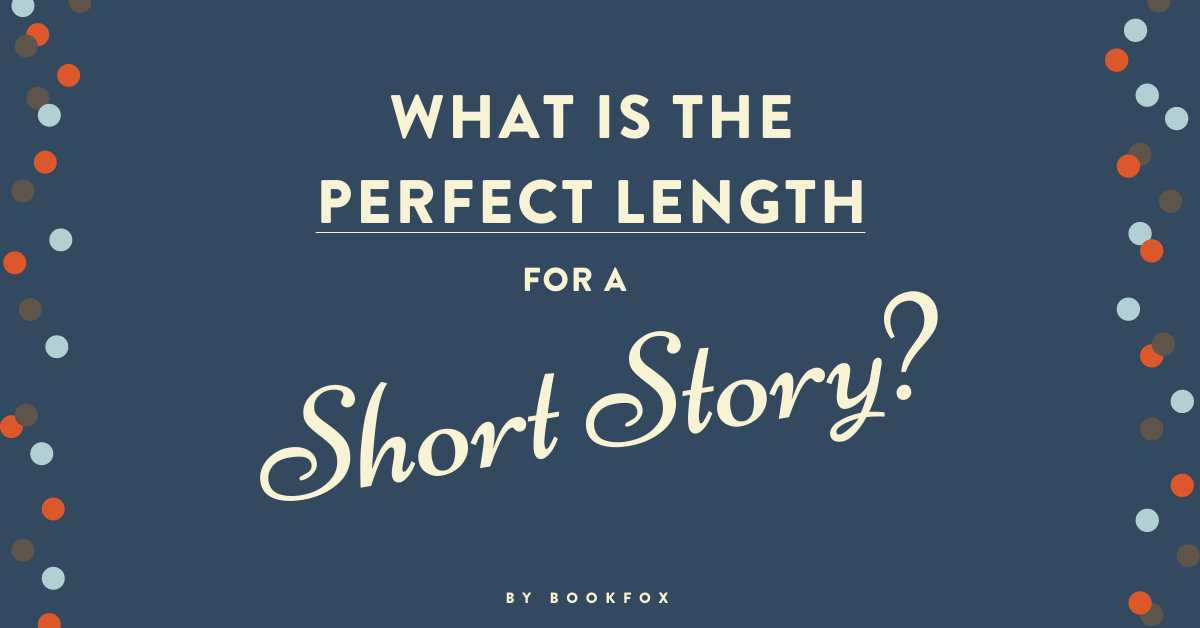 The perfect length of a short story can be tricky to figure out. Make it too long and you exceed the reader’s attention span and nobody wants to publish it; make it too short and you have flash fiction on your hands.
The perfect length of a short story can be tricky to figure out. Make it too long and you exceed the reader’s attention span and nobody wants to publish it; make it too short and you have flash fiction on your hands.
Edgar Allan Poe described the proper length of a short story by saying it had to be something readable in a single sitting. I like that. It measures a short story by reading time, rather than page length or word count. But I think word count is the easiest way to measure story length.
How long should a short story be? Well, to help you decide, I have compiled the word counts from the top five short stories of seven different authors. I will show you the average short story lengths, so you can make an informed decision about how long to make your short story.
Average Story Length of Seven Famous Authors
Although Márquez has an average word count of 2,412 words and overall his short story lengths are quite consistent at the high 2000s, he also has a flash fiction of only 994 words.
“One of These Days” may be short, especially when compared to “Death Constant Beyond Love,” but that doesn’t make it any less popular than his other stories. Márquez is a great example of how you can play around with the lengths of your short stories, and how having a shorter story does not necessarily mean a sacrifice in quality.
Ray Bradbury, a legend in the short story universe, has a lot more diversity in his short story lengths. He writes short stories at the upper lengths of mid-6,000s, and he writes stories at the lower end of the 1,000s, and also in the mid-range at 4,000 words.
Personally, I’ve always considered 4,000 words to be a sweet spot for short story word count, but Bradbury teaches us that you can create amazing storylines in both fewer and more words.
Despite a difference in their average word counts, both Bradbury and Carver share a wide variation in story lengths. Neither author appears to keep to any specific length, but both go no lower than 1,400 and no higher than 6,500.
Publish your story in your dream magazine.
Get a professional editor to look at your story and give feedback.
Hemingway appears to have two methods to short story writing; his stories are either lengthy or very short. This disparity between word counts may seem a bit daunting at first, but Hemingway wonderfully illustrates that you don’t have to stick to writing one length over another.
Munro is definitely unusual in the short story world. Unlike many of the other writers we’ve seen, she writes at the upper end of short story word counts. Her shortest is 6,000+, which is usually the high end for most writers.
Even though the short stories are long, they are extremely compressed. She is fitting novelistic storylines — grand sweeps of life over many decades — inside only 10,000 words.
O’Conner is another example of a lengthy short story writer. Although her average word count is 3,313 less than Munro, O’Conner does have the second highest average. Both of these authors prefer length to brevity when it comes to their writing. And with longer short stories allowing for a longer plot and greater character development, among other things, it’s not hard to see why.
With the exception of “The Fall of the House of Usher,” Poe tends to keep his short stories short. Very short, actually, with three in the mid-2,000 range.
Okay, now for the results…
So if you look at the graphic above, we see the average length of all these short story authors is:
5,100 words
That’s the sweet spot, folks.
If you don’t know how long to make your short story, shoot for around 5,000 words.
What lessons can we learn about how long a short story should be?
1. Professional short story writers often write shorter short stories than you’d expect.
Before making this list, I would not have guessed I’d see so many stories under 2,000 words. I think of 99% of short stories falling between 4,000 and 6,000 words, but I think this list proves that idea wrong.
2. There are no exact lengths a short story must be.
Looking at these graphs should teach you that the short story is a very flexible and adaptable form. You can write almost-novellas like Alice Munro or you can write tiny jewels like Gabriel Garcia Marquez.
3. The goal for your short story should be to make it the right length for your story.
Some 6,000 drafts of short stories would be much better as 3,000 stories. And some 2,000 word stories should be expanded to 5,000 words. The trick is understanding the length that your particular narrative requires, and fulfilling your duty toward it.
4. Unless you’re aiming for flash fiction markets, you should probably write longer short stories.
First of all, it’s much harder to write very short stories that are good. Give yourself 4,000 words of space. Second of all, this list skews to the shorter side because anthologies prefer shorter stories because they can fit more of them, and therefore the most famous short stories are shorter. I think the average short story published in literary journals might be a little longer.
Remember, the key to writing a great short story does not exist within its length, but in its ability to last in memory.
Here’s a graphic that illustrates the difference between short story lengths and the lengths of other genres.
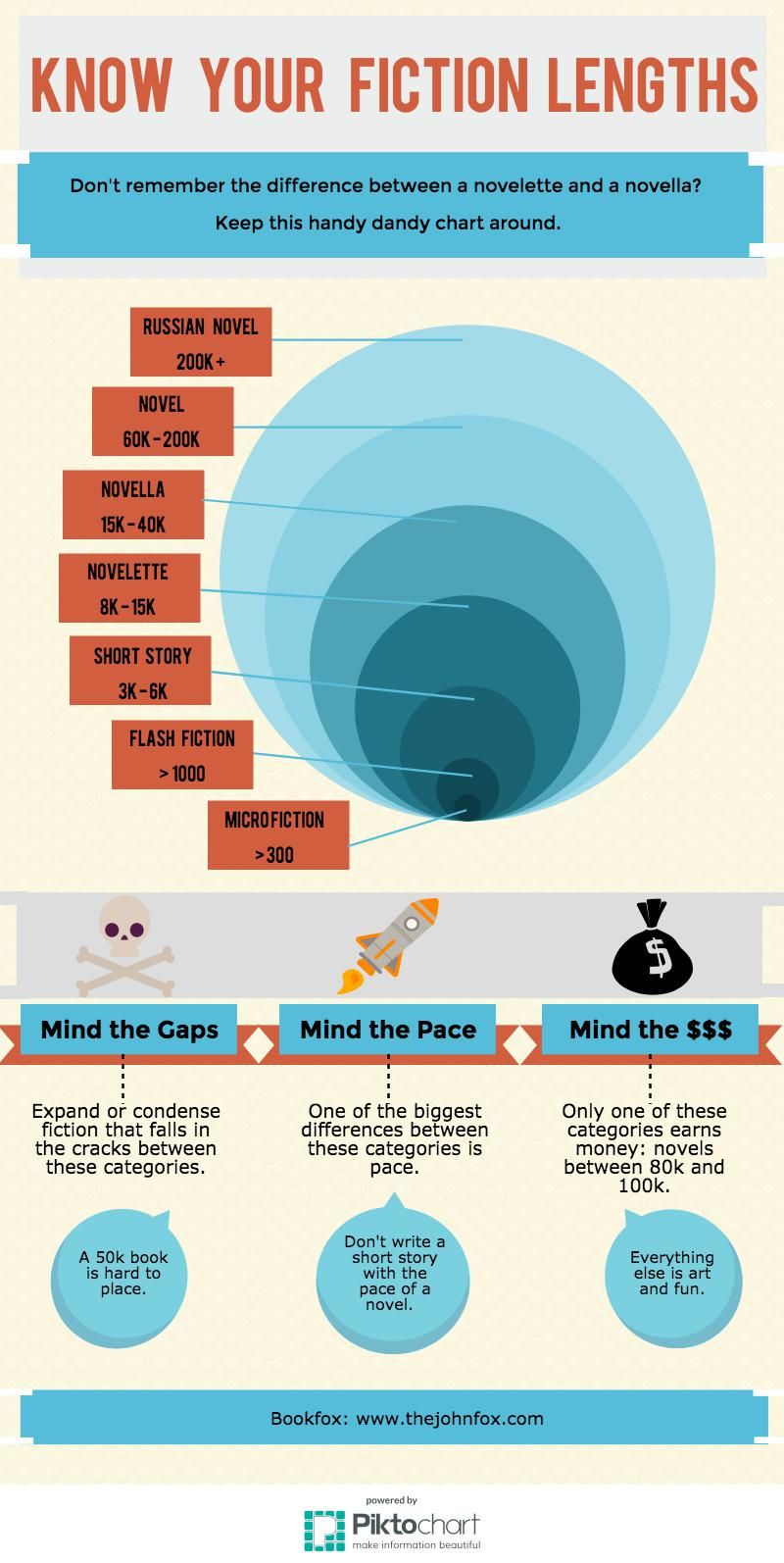
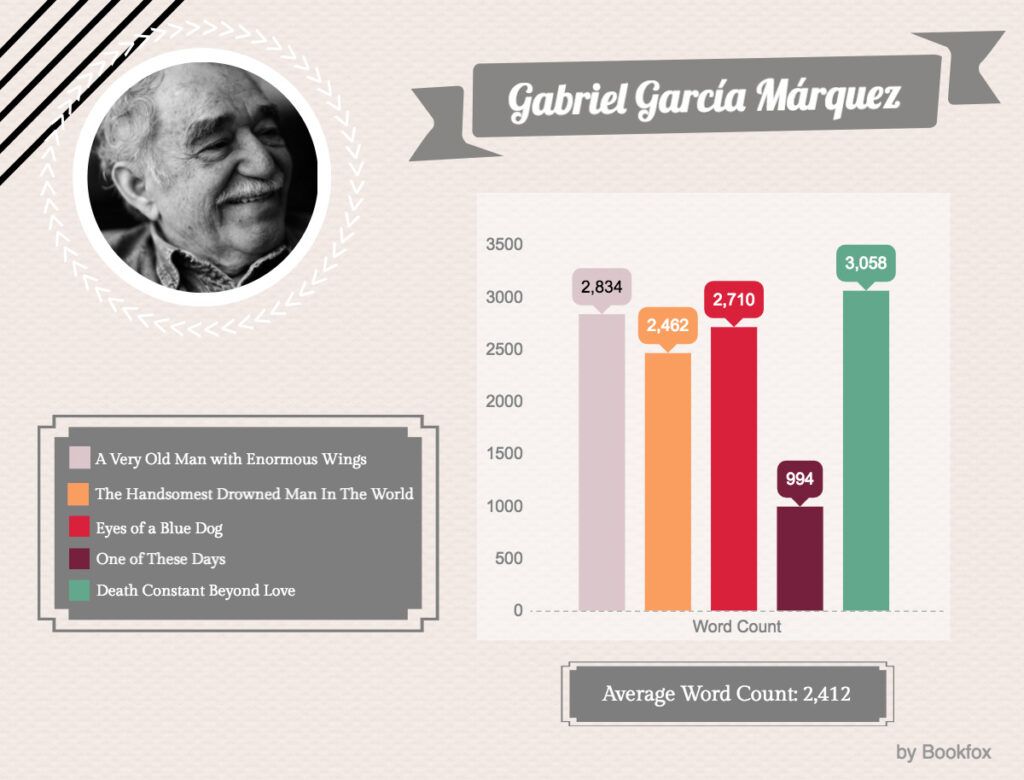
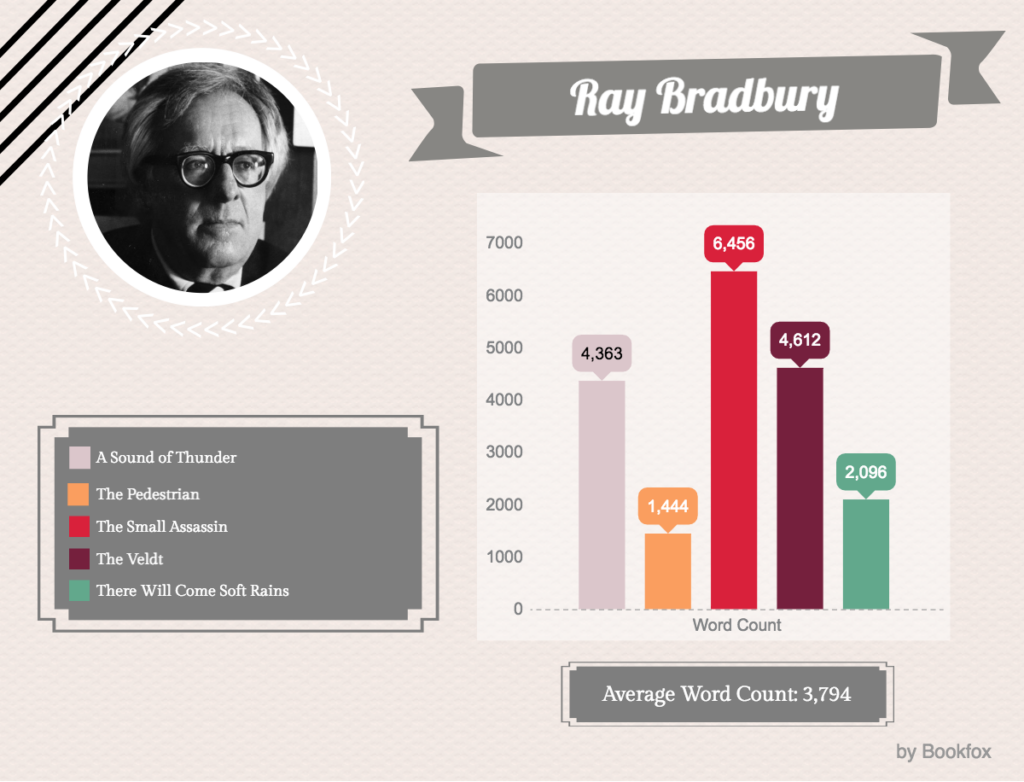
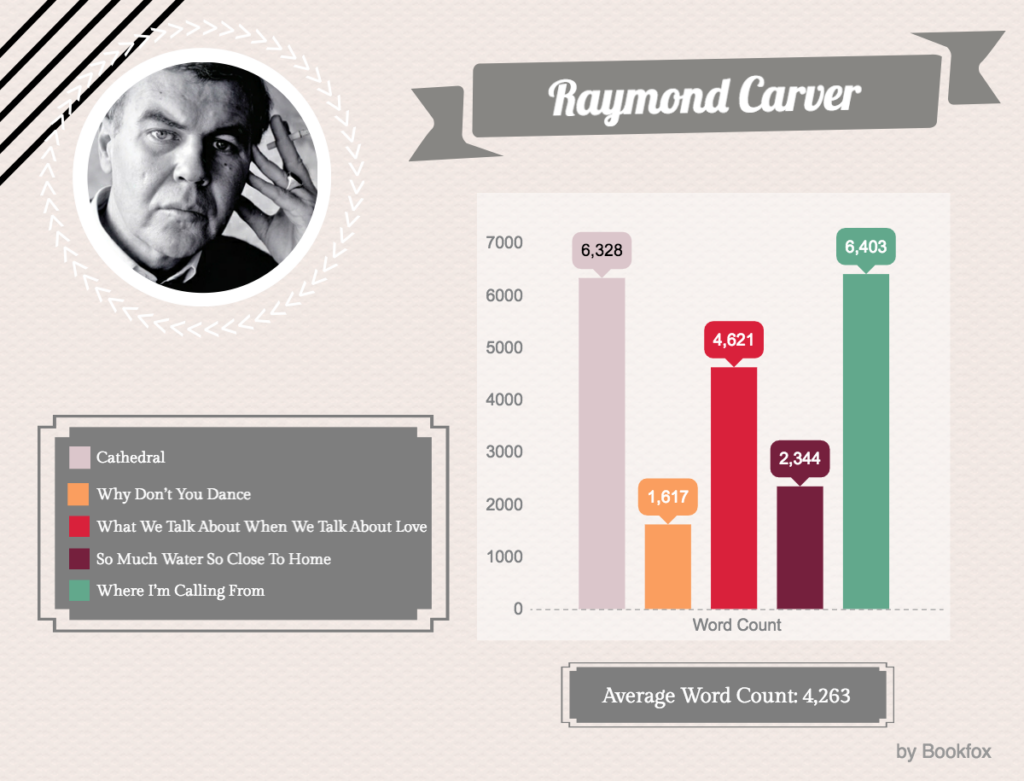
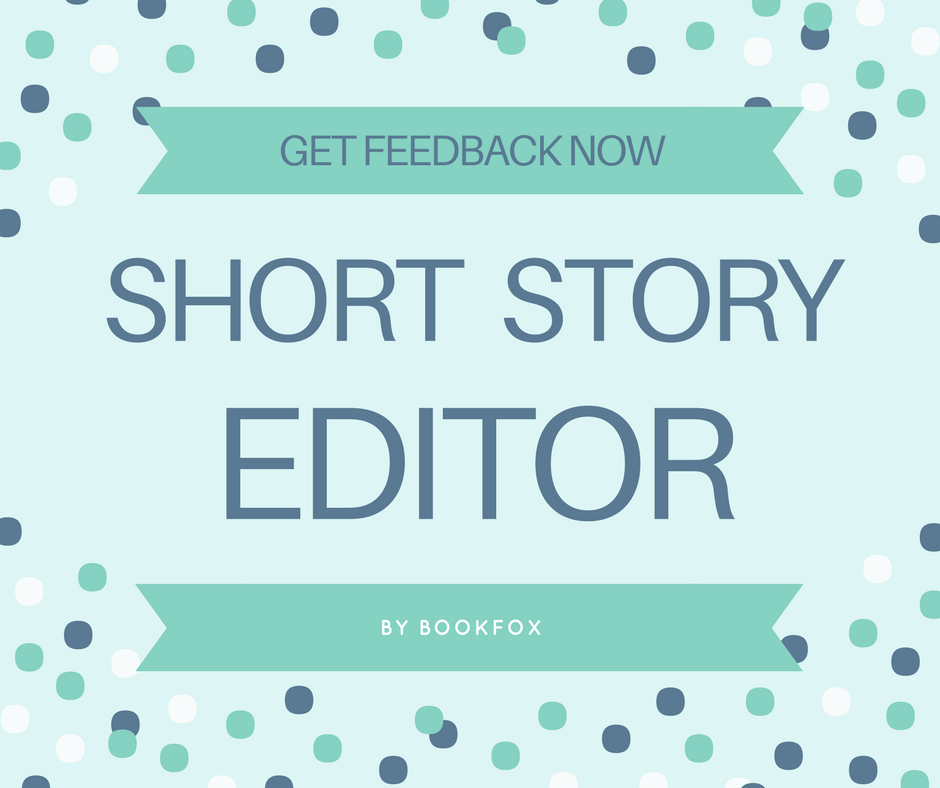
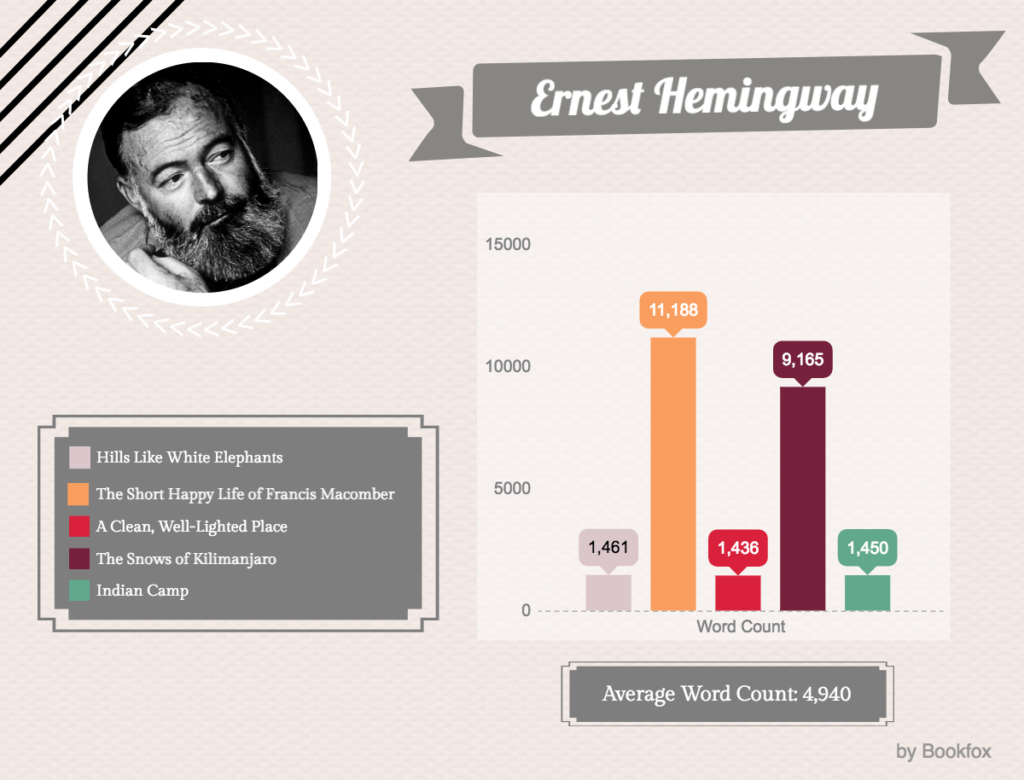
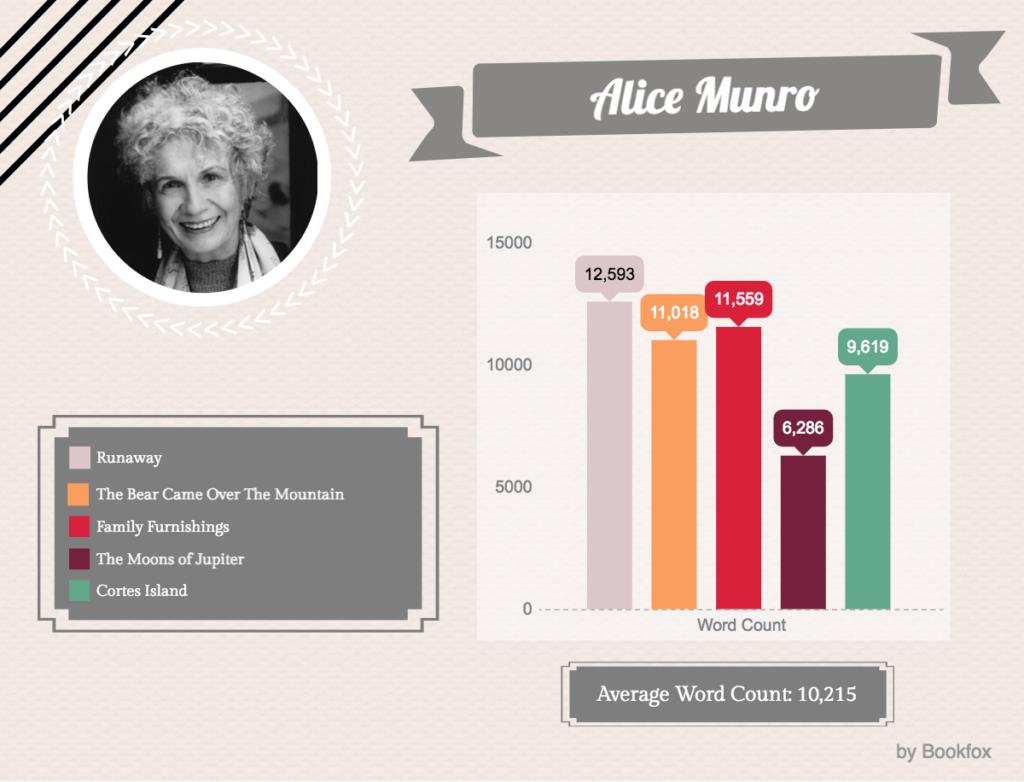
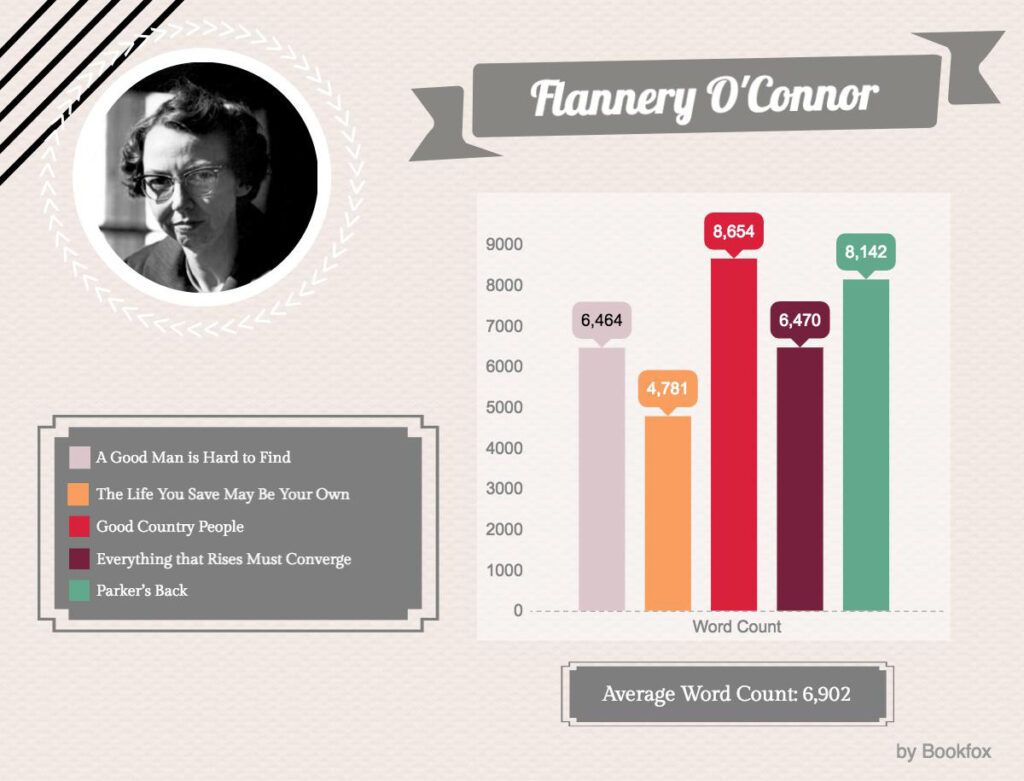
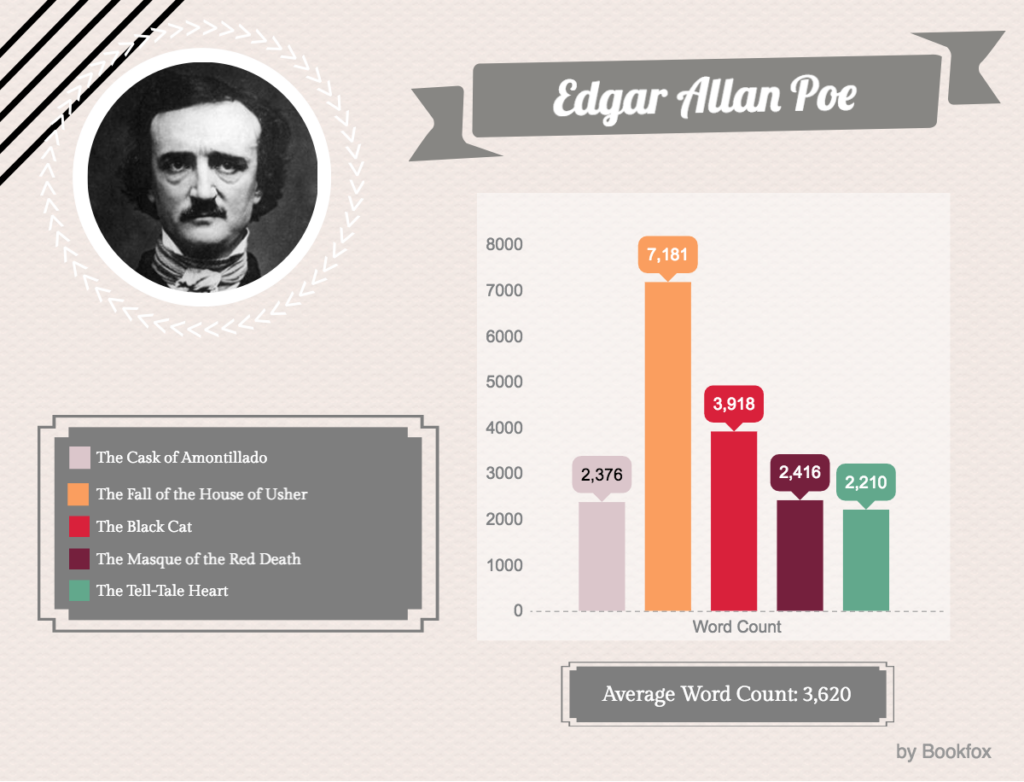
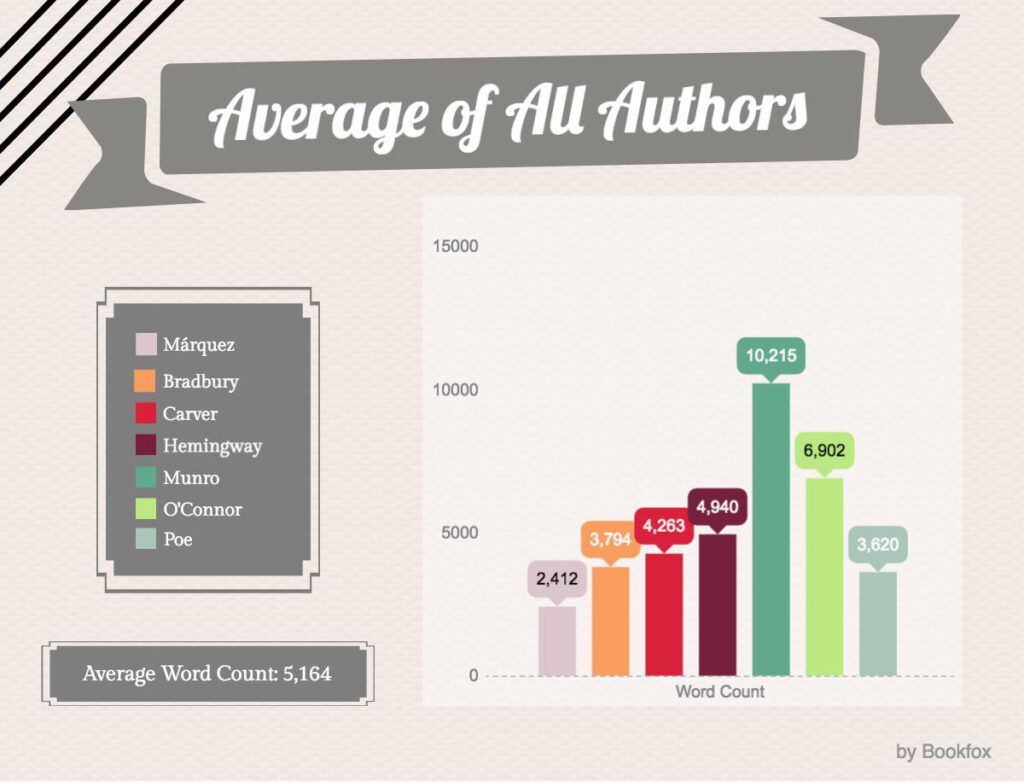

58 comments
Very interesting- thanks. Should you always have a length in mind? Does it matter if you start of with the intention of writing a short story and end up with a novella? Do labels really matter? Should you get an editor?
I think you should have a flexible length in mind — sometimes short stories get away from you, and they demand their own length. That’s fine. You just have to figure out the right length for the type of story you’re trying to write.
But as writers get better at writing short stories, they start to train their imagination to create ideas appropriate for short stories. The main thing I notice with beginning writers trying to create short stories is that they can only come up with book-length and movie-length plots, and so every short story they write feels like it should be longer — like a novel.
It’s always helpful to get an editor.
“…sometimes short stories get away from you, and they demand their own length” – there’s something about that line that made me cringe. I, as the writer of my story, as the one who knows the beginning and middle and end of his story, cannot allow them to get away from me. I know what effect I’m trying to create and what mood I’m trying to set so I already have the length in mind. Maybe I’m writing incorrectly…but I determine how long or short my story is, not the characters or whatever else people who sit down to create stories claim their stories do outside of them. I’m sorry but…I just don’t understand that.
There’s a divide between writers who demand absolute control over their creations, and writers who try to listen to their stories and characters and work with how they are evolving. I tend to fall to the latter side of the divide.
I think a lot of writers out there find that they sit down to write a short story and it ends up demanding a much longer length. Only those well trained in short story writing have the ability to conceive of stories in a short format — beginners especially tend to bite off more than they can chew.
I agree with Maleeq. Also, your response to him hinted at, even if unintended, your way being the better way to write fiction. Just your word choice alone – “writers who ‘demand’ absolute control…” vs “writers who try to ‘listen’ to their stories and characters and work with how they are evolving.” It was almost condescending. I don’t think people like him “demand” perse, they probably just know beforehand what they want and stick to it. I doubt he has no flexibility when writing. I also never really believed in characters guiding anything anyway. It’s a fun and interesting way to think about your piece, and makes it enjoyable to write – I get that – but when it’s all said and done it’s not the characters making decisions, it’s your brain. The characters and story in and of themselves do not have a life of their own, no matter how much imagination you have. Although I understand what you mean by “listening to your characters,” that isn’t the only way to get a great story out.
I will agree with you on the last part. SOME beginners definitely bite off more than they can chew, at least too early on.
One year later — I’m new to writing for profit but I never do. It wasn’t until I reached out to a publisher did word count start to be important to me. I don’t like the way that feels. Word count is the last thing anyone should be concerned with in terms of writing an amazing story. Write your story then classify it later.
Thanks
Absolutely amazing !!!
Thank you very much! I know, the graphics are pretty cool.
Finally a little sense in the questioning world of the unsubmitted story writer. I have found it difficult to find someone with enough intelligence to communicate on a similar level. I once entered a contest with what I thought was a superb story only to be awarded an “Honorable Mention”. Hmmm. Who wants to be in fourth place? They simply didn’t understand. So let’s see what I can do with the proper forum.
Thanks much for this! Do you think 2000-3000 words story would be too short for a short story?
Nope! On the shorter side, but not too short. On when you get below 1000 is it technically flash fiction.
I am a new writer and have been working on what I intend to be a memoir about triumphing over a medical condition. How do I determine whether my work will be a short story or a memoir? Do you suggest I get advice from an editor or someone else? Will the structure/outline be similar?
Just depends on how much content you have. Short content = short story. If you can write about 60,000 – 80,000 words, then it’s a memoir.
This was very helpful! 1. I never know how to classify my work. 2. I had no idea Hemingway was so handsome. 3. I will be sharing this article. It illustrates word count vs quality which I think boils down to a writer’s style of storytelling.
Thanks SO much for the guide on fiction lengths!
This is super helpful. Thanks for taking the time.
My background is in journalism, PR, marketing, speech-writing etc. I’m also a professional translator (from German and French into English). At 80 and still active, I’m now planning to write a short story and have just discovered your interesting and helpful suggestions about short-story lengths. My planned story is largely (‘tho not exclusively) semi-autobiographical. My inclination is therefore to write in the first person rather than the third person. I’ve asked others writers, but their opinions differ. Any advice . . . . . .?
Many thanks – and congratulations on your informative website.
I’d try to write the first person. It’s easier and has less pitfalls than the 3rd person for beginning writers.
For some reason, my short stories almost always end up somewhere around 3,000-4,000 words. I don’t know whether that’s a reflection of my own attention span, or due to my own writing style. When I do try to push my stories to longer lengths, often it feels like I’m just padding them out for the sake of the word count and nothing more.
That’s a good word count. Pretty much the sweet spot for literary magazines. And never pad them out. Readers can tell.
Is there a market for a book of novellas? I’ve written quite a few just for the enjoyment, but haven’t really tried to exploit them. When I was 22 I wrote a novel that was published and made me some quite good money. I went on to spend my professional life in Los Angeles writing for the film industry, but now I’ve retired overseas and have started writing novellas — 31 so far. They average about 20,000 words, are character-driven and fairly plot-intensive. A collection of any four would be about the length of a novel. Is there a market for such things?
Yes, check out my list of novella publishers.
https://thejohnfox.com/journals-accepting-novellas/
Perfect! What an extraordinary resource you are. Thank you much.
kent
Mr. Book Fox,
Hello, today is November 4, 2018.
I’m in hopes that your still available to answer my questions.
I am writing a non-fiction book on grief , and writing it has been quite difficult, so therefore I have to take a break now and then however, it has been therapeutic for me to say the least. The question I have how many may pages would be appropriate to bring a grief book to end if there is such a thing.. I’ve been writing my story for over an year, and haven’t seem to come to a closer, nor seen the light at the end of the tunnel as yet.
I would appreciate a reply at your earliest conveniences .
Sincerely,
Clara Murrels
This is probably the best answer to my question I’ve ever read.
I love the line in your graphic regarding short stories, “Everything else is just art and fun.” I couldn’t agree more. My three passions are stone carving, brewing small batches of beer and writing short stories (not necessarily in that order), all of which I have long classified as art. It is art that I do for myself, not for fame or monetary gain, but for the enjoyment, the solitude, the journey, and of course the successful completion of the piece – whatever it may be.
I’m 83 years young and have started writing about stories I heard the grownups talking about. We live in the country but the stories were about what was happening in the nearest large city. There is now doubt that what I recall and what actually happened are different, so I am having one main character, a detective, relating his adventures in 1st person. I googles “how to write a short story” and ended up very confused as to the true meaning of a short story. My stories are running between 1,5000 word and 5,600 words. will it be accepted for me to tie each story together in one longer story. Thanks for you answer and I enjoyed you website.
So pretty much every alice munro story you have listed bar one is a novelette, just curious why you included all them when they are not actually considered “short stories” at all or do you just consider everything under 15k words a short story?
Yes, Munro is really a special case. I mean, she really is one of the greatest short story writers of all time, and I feel like her most well known short stories are a bit longer, so I had to include them.
Normally the cut off for short stories is about 6,000 words, but I feel like if you look at the master’s of the short story, sometimes they’ll expand that a bit. I hope by looking at a cross-section of famous writers, both those who wrote shorter material and those who wrote longer material, you’ll get a good sense of the short story average length.
I am told that a first time novel should be 80,000 words. I am now at 50,000 and I have a choice to chop it down to 5,000 or increase it to 80,000. Yikes.
I just wrote a 3,000 word short story and probably the longest story I’ve written in a long while, I usually write micro flash fiction stories that are 100 words or less, most I write are exactly 25 or 50 words however. I think that the lengths for all the different stories seems pretty average. My last story story was probably just over 2,100 words which I wrote over four years ago. I really enjoyed this post, thanks for sharing!
Hi. I’m a newbie writer. My experience begins with Wattpad recently. However, I have this setback with myself. I happen to always compare my own story with others since I still read many of novels written by other writers in Wattpad and Inkitt. Let alone published novel with perfect editing and storyline. Is this wrong to compare my own story with others? It does give me less confident and decrease interest to continue my own story because I see the flaws now. Yet my imagination still there roaming around my storyline.
Hi, Magen Meg!
I am in no way an accomplished author or brimming with experience in regards to this, but I am on Wattpad so I thought I might see if I could help you out a little. I don’t read much on Wattpad because the ones I find aren’t terribly well written (linguistically or plot wise) but when I do, I focus more on the plot than comparing it to mine.
Not to say that I don’t. I most definitely have. I haven’t updated a lot of my stories in months because I don’t have the motivation to write them and I feel like they’re not going to be well received when I do. Then I convince myself to write them later, when I feel like, not right now. So from personal experience, I know where you’re coming from. My advice is that you don’t stopper your imagination for your doubt.
They’re novels have more than likely been edited hundreds of times, nearly deleted a few dozen and almost completely ignored for days on end. I don’t know if it will help, but try to keep in mind that they were like you in the beginning too.
If this helped at all, come and chat on Wattpad (BookwormOfTheAges or Whovian378).
Courtney.
Hello there,
Thank you for compiling this information and presenting the data the way that you did.
I was introduced to the art of short stories by Andrew Pyper – who admires Alice Munro’s work – in his collection of short stories, “Kiss Me,” and needless to say, I fell in love. If by the off-chance you have not sailed through any of his literary passages, I urge you to get rowing with promises of pink skies.
Side note: Might I ask what program/software you used to slice and dice this presentation?
Hi!
I have been writing a novel for a few years and am at about the 80,000 word mark. However, I’m wanting to scrap it and start again because I have changed my mind completely about the characters and some points in the plot. Would you suggest that I keep writing or scrap it and start again? What is your general advice on editing (i.e. finish the book and then edit, or keep yourself on the plot you want)?
Thank you kindly,
Courtney
It’s tough to scrap novels or rewrite them wholesale, but the majority of authors do it — sometimes with every book! Don’t be afraid to rewrite to make it the best it can be.
As another newbie author I wish to thank you for compiling this information. I found it most helpful as I often wonder if my work is long enough or is it short enough to be a short story?? Now I see the many categories and find — mine all fit (somewhere).
This is very instructive. Thank you, Mr. Fox! 🙂
The issue with writing first and classifying it later (as someone has mentioned) is that short stories have different foundations and structures than novels. Short stories typically only have one climax, very few characters, and only one (or two if on the 20k word side) setting, and occur within a very short time frame. Short stories often jump right into an action and provide a little back story as the action takes place. Novels on the other hand tend to have a lot of descriptive language and back story long before getting to an action. Novels also have more than one problem. There are many ups an downs, twists and turns, spanned over a longer period of time, but short stories do not have that luxury since they are by nature, shorter. Knowing what kind of story you are intending to write I think needs to be at the forefront of your mind. If you find there’s more story to be told, then restructure it so it can become a novel. I’ve learned that short stories are at least 1,000 words and no more than 20,000 words. On the higher end, they are often times called Novelettes or Novellas, which may require an extra setting or character depending on the story.
Hi,
I grew up ingesting large amounts of Clarke, Asimov, Bradbury, Wells, Verne, Tolkien…the list goes on and on! I’m a sci-fi (and fantasy) junkie, and I’ve been writing about it since I was twelve years old. Next year is the thirty-eighth anniversary of my twelfth birthday, and I’m still plugging along, but I’ve never been published. There’s the “art and fun” part for ya’.
HOWEVER, I’d say that profit CAN be made from pieces shorter than the standard novel…it’s not the only format that pays. After all, I sent a great amount of dollars over the years to Mr. Ray Bradbury for his fine short stories, not to mention many of the other authors on my list of favorites, and I’m sure a lot of other folks did too.
My point is, if a person as a new author suddenly feels insecure because “all they write” are short stories…take heart!
1) Put a bunch of them together and call it an anthology! As a boy reading my favorite authors, I especially loved anthologies because I could read one story quickly (fire the mental rockets, we’re going to Mars!), go outside and live that adventure with my buddies, and always look forward to coming back for another quick dose of excitement in the next story. And there were so many! I didn’t feel tied down (in my impatient childhood way) to a looong story I would probably get tired of, and there was always something to look forward to later, just like a favorite TV show. 🙂
2) Got a friend who loves art? Comic books are a big thing. Just never tell your friend that they’re now the one doing most of the work while your short story fills in all those speech bubbles…
3) Children’s books! Dr. Seuss won a $50 bet that he could write a great book with fifty words or less…and “Green Eggs and Ham” was born.
But yes, the spirit of the statement on the graphic is probably true. A single short story wouldn’t sell.*
*Challenge to write the most anti-climactic comment ever…accepted and done.
I think it false to assume that you shouldn’t write a short story with the pacing of a novel. Throughout the article it was said that length should be of service to the content – in essence the story itself. Even short stories would better from a slower pace, as the focus and themes of the piece may lend themselves to a separation of moulds and expectations.
I think above anything else that my argument is a testament of the versatility of story writing, and that in one way nothing is incorrect.
Hi Ryan, Thanks for that thoughtful comment. I suppose it is possible to write a short story with the pacing of a novel — and some famous short stories have had slower pacing. I suppose my comment was more of a practical nature: if you want to have a higher chance of getting acceptances from literary magazines, you would want to embrace the current short story form, which requires a faster pacing.
If you want to be more experimental in your pacing, I think that’s wonderful, but you also have to accept it might be harder to get your story published.
I am 83 years old, and my doctor tells me I am his healthiest senior. I want to buy a motorcycle and ride it while I still can. I have written a number of short stories and children’s stories and one novel which is between 70 and 80 thousand words, have not tried to publish them. I do not read novels, if I have read any in my life I do not remember them. I do not read novels because reading is not creative. I am a pianist, composer, artist, designer, writer, theologian, craftsman, and scientist. Some might say I am not a scientist, but I say I am. I need money, if you don’t have money you can’t do much. My keyboard has to broken keys, my accostic piano hasn’t been tuned in 34 years, my transmission on my little pickup blew up. So it is important to make money writing. I don’t like “everything else is just art and fun”, when I write a short story, and it is very good I think I need to be paid for it. I do not decide beforehand how many words, I just write the story. I do not use outlines. When in highschool the teacher ask us to write a story and when I did the teacher blurted out right in class “You didn’t write that”, yes it was my story. You can’t win!
I would just like to counter and say that reading is creative! Writers, yourself included, are never directly injecting ideas into the minds of their readers. Readers are not passive spectators. I encourage you to read and begin to understand how your own readers understand and find meaning in your work!
Hi Phillip, I read your comment and found interesting. How has it been going since?
Best,
Rob Hoover
Found this article interesting, I write what I call short stories. Word counts not that important but average between 3000 and 10,000. I am hoping to put them all in a book called Tea Time Tales, as I think most of them could be read over a half hour break. Subject matter ranges from romance, escapism murder mystery. Maybe I’ll have a go at children’s stories for a seperate edition. My question is, is there a market for a collection of shorts. Either paperback or as a online publication, I write for myself but would like feedback, good or bad.
There is not a market in terms of selling a lot of copies, but there are certainly lots of short story publishers out there. It would be better if you had a clearly defined theme (for instance, if all the stories were about romance, or all of them murder mysteries).
https://thejohnfox.com/publishers-of-short-story-collections/
Thank you.
Most helpful.
I received 2 emails of late: one issued the challenge of writing a short story per week and the other gave a “list” of unique and interesting story-starters based on the theme of ‘memory.’ This post was very helpful because I’m a pantser that has written for over 30 years and only published 1 thing because I procrastinate. The short story ‘sweet spot’ of 5,000 – 5,100 words helps my decision to try my muse out with the once-a-week challenge (and my writing dedication-minus-procrastination). I appreciated the post and your time and obvious expertise. Thanks!
Calling Gabriel García Márquez just “Márquez” is incorrect. Following Latin American naming conventions, García is his father’s family name and Márquez is his mother’s family name, so García Márquez is his last name. Please fix this error!
(To English speakers, this would be the equivalent of shortening the last name Johnson to John. It’s just incorrect.)
thanks smith
How to write a good short story. The hook, and satisfactory denouement are obligatory. The correct measure of backstory essential. Cut the waffle and don’t waste words. Let your story determine length.
Wow, Absolutely amazing article.
Your data are so appealing.
dunno. sometimes i just write to write. got a couple of stories now that are novelette length and one i need to cut chuffa from and another expand. i think it depends on what the story needs. after 81 books i’ve still got no idea what i’m doing, but i’m getting farther on the right side of the dunning-kruger curve. there’s that. thanks for the article. good stuff maynard.
Great article; I would add two considerations. First, think of your favorite short stories and look at their length. Not only does this tell you what you may find most enjoyable to write, but it also may determine what length you naturally tend towards. Your own expectations of rhythm, complexity of plot, and narrative style, are necessarily formed by what you’re reading. You can choose to lean into that or do something different. If you’re trying to write a piece that’s much longer or shorter than what you typically read, try to read more pieces at your target length.
Second, if you have any interest in publishing, look at the magazines you’re most likely to submit to. You may be surprised to find they have word count limits much shorter than what you intended to write, or are currently writing. Of course, we all write some stories just to get a certain vision down on paper, and publisher word count shouldn’t be your only consideration. But if you don’t have a strong immediate feel for how long a story should run, publisher requirements can provide another guidepost.
I really enjoyed your content. The details was particularly impressive. It’s clear that you put a lot of thought and effort into this. Keep up the great work!